English Words in Action, Group U
(a variety of English words which have developed through history and are currently used in our modern age)
Simply click on this banner (or the following link) and you will be on your way to stimulate your brain for greater word comprehension with quizzes based on some of the words in this unit.
2. Relating to a bureaucracy which is badly managed or operated: The very elaborate and complicated tax system in the country was so unwieldy and inefficient that the new government decided to revise it completely.
3. Etymology: un-, "not" + wieldy, "difficult to handle, awkward by virtue of size or shape."
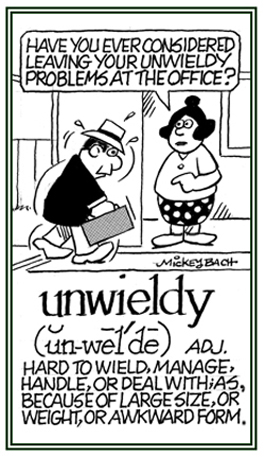
Go to this Word A Day Revisited Index
so you can see more of Mickey Bach's cartoons.
2. Etymology: from Old English unwitende, "to become aware of, to learn".
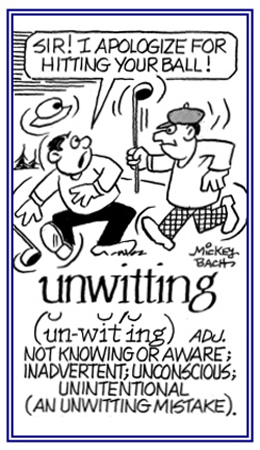
Go to this Word A Day Revisited Index
so you can see more of Mickey Bach's cartoons.
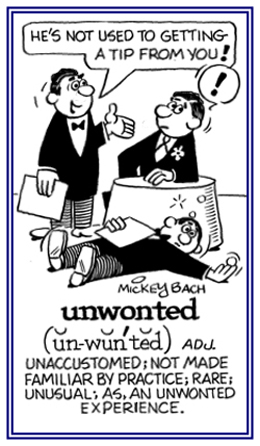
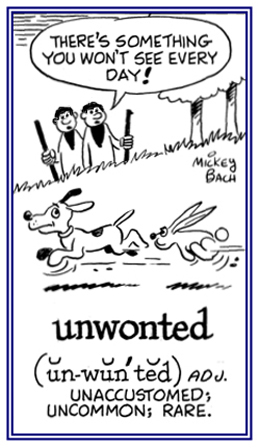
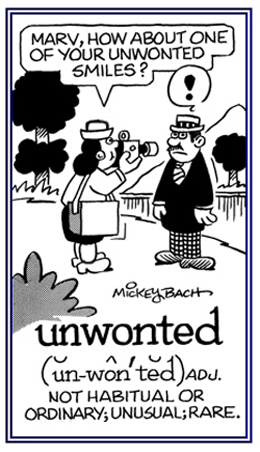
Go to this Word A Day Revisited Index
so you can see more of Mickey Bach's cartoons.
It's easy to understand up, meaning toward the sky or at the top of the list, but when we awaken in the morning, why do we wake up?
At a meeting, why does a topic come up?
Why do we speak up and why are the politicianss up for election and why is it up to the secretary to write up a report?
We call up our friends.
We use it to brighten up a room, polish up the silver; we warm up the leftovers and clean up the kitchen.
We lock up the house and some guys fix up the old car.
At other times the little word has other special meanings.
People stir up trouble, line up for tickets, work up an appetite, and think up excuses.
To be dressed is one thing, but to be dressed up is special.
A drain must be opened up because it is stopped up.
We open up a store in the morning but we close it up at night.
We seem to be pretty mixed up about up!
To be knowledgeable about the proper uses of up, look the word up in a dictionary.
In a desk-sized dictionary, it takes up almost 1/4th of the page and can add up to about thirty definitions.
If you are up to it, you might try building up a list of the many ways up is used.
It will take up a lot of your time, but if you don't give up, you may wind up with a hundred or more.
When it threatens to rain, we say it is clouding up.
When the sun comes out we say it is clearing up.
When it rains, it wets the earth and often messes things up.
When it doesn't rain for awhile, things dry up.
One could go on and on, but this will wrap it up; for now, the time is up . . . so, it is time to shut up!
2. Etymology: from Old English upbredan, of uncertain origin; probably literally "to throw something up (against a person as a fault)"; formed from bregdan, "to move quickly, to throw".
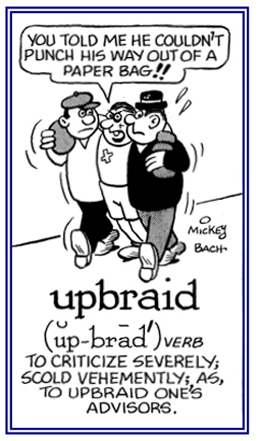
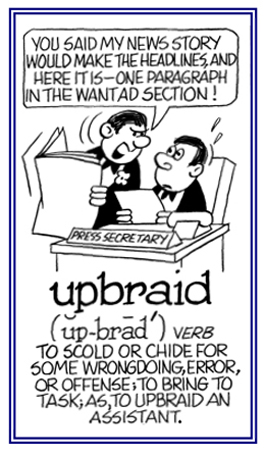
Go to this Word A Day Revisited Index
so you can see more of Mickey Bach's cartoons.
2. Etymology: from Latin ericius, "hedgehog."
From Middle English hirchon, urchon, "hedgehog", from Old Northern French herichon, based on Latin ericius, "hedgehog".
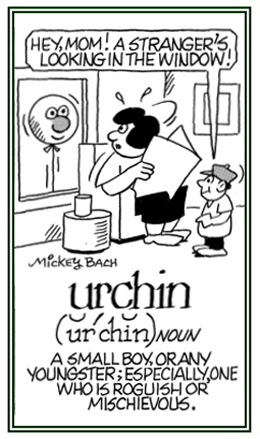
Go to this Word A Day Revisited Index
so you can see more of Mickey Bach's cartoons.
Links to all of the groups of English words in action, Groups A to Z.
You may see the bibliographic list of sources of information for these words in action.

